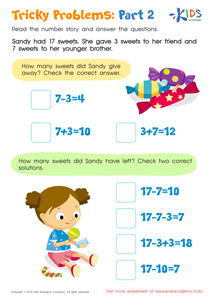Basic Addition Skills Grade 2 Adding up to 1000 Worksheets
3 filtered results
-
From - To
Enhance your second grader's math journey with our engaging "Basic Addition Skills Grade 2 Adding up to 1000 Worksheets." Designed to build confidence and proficiency, these worksheets introduce essential addition concepts, challenging students to solve problems that require summing numbers up to 1000. With diverse exercise formats, including word problems and visual aids, children will enjoy practicing their skills in a fun and interactive way. Each worksheet supports the development of critical thinking and problem-solving abilities, making math both enjoyable and effective. Perfect for classroom use or at-home practice, these worksheets are the ideal resource for mastering basic addition in Grade 2!
Basic addition skills, particularly for Grade 2 students learning to add up to 1000, are foundational for their mathematical journey and overall academic success. At this stage, children begin to understand not only the mechanics of addition but also its real-world applications. Mastery of addition enhances problem-solving abilities and boosts confidence in handling more complex concepts in subsequent grades.
Moreover, strong addition skills contribute to the development of critical thinking and analytical capabilities. As children progress, they will encounter more advanced mathematical operations, making proficiency in basic addition essential. It lays the groundwork for skills such as subtraction, advanced arithmetic, and even later topics in algebra.
In addition, understanding addition fosters numeric fluency which is vital in daily life tasks, such as budgeting and shopping. It also helps in enhancing kids’ cognitive skills like memory and attention as they learn to handle various number combinations.
For teachers and parents, fostering these skills means nurturing a child’s overall educational experience. Together, they can create engaging and supportive environments where children can practice and master basic addition, setting them on a path for lifelong learning and success in mathematics.













